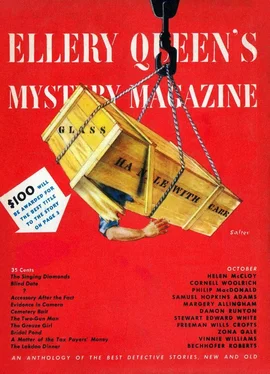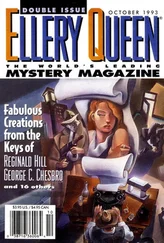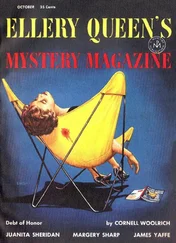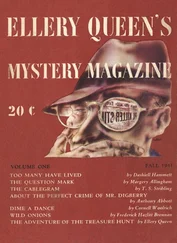Марджери Аллингем - Ellery Queen’s Mystery Magazine. Vol. 14, No. 71, October 1949
Здесь есть возможность читать онлайн «Марджери Аллингем - Ellery Queen’s Mystery Magazine. Vol. 14, No. 71, October 1949» весь текст электронной книги совершенно бесплатно (целиком полную версию без сокращений). В некоторых случаях можно слушать аудио, скачать через торрент в формате fb2 и присутствует краткое содержание. Город: New York, Год выпуска: 1949, Издательство: The American Mercury, Жанр: Классический детектив, на английском языке. Описание произведения, (предисловие) а так же отзывы посетителей доступны на портале библиотеки ЛибКат.
- Название:Ellery Queen’s Mystery Magazine. Vol. 14, No. 71, October 1949
- Автор:
- Издательство:The American Mercury
- Жанр:
- Год:1949
- Город:New York
- ISBN:нет данных
- Рейтинг книги:5 / 5. Голосов: 1
-
Избранное:Добавить в избранное
- Отзывы:
-
Ваша оценка:
- 100
- 1
- 2
- 3
- 4
- 5
Ellery Queen’s Mystery Magazine. Vol. 14, No. 71, October 1949: краткое содержание, описание и аннотация
Предлагаем к чтению аннотацию, описание, краткое содержание или предисловие (зависит от того, что написал сам автор книги «Ellery Queen’s Mystery Magazine. Vol. 14, No. 71, October 1949»). Если вы не нашли необходимую информацию о книге — напишите в комментариях, мы постараемся отыскать её.
Ellery Queen’s Mystery Magazine. Vol. 14, No. 71, October 1949 — читать онлайн бесплатно полную книгу (весь текст) целиком
Ниже представлен текст книги, разбитый по страницам. Система сохранения места последней прочитанной страницы, позволяет с удобством читать онлайн бесплатно книгу «Ellery Queen’s Mystery Magazine. Vol. 14, No. 71, October 1949», без необходимости каждый раз заново искать на чём Вы остановились. Поставьте закладку, и сможете в любой момент перейти на страницу, на которой закончили чтение.
Интервал:
Закладка:
On Miss Allingham’s knee rested a copy of the Medico-Legal Society’s quarterly report (c), containing an article on “Psychiatry and Degrees of Murder.” Miss Allingham was in need of a short-story plot and had intended to read the article during the railway journey, in the hope of picking up a psychological gimmick. But Medico-Legal journal remained unopened and unread. Instead, to occupy her thoughts, were (a) the sardine-packed scene, (b) the helter-skelter dramatis personæ, and (c) the swinging, swaying silver string.
And then came the catalyst (d). Just before the train arrived at its London terminus, which is dark and sooty and approached by many bridges, Miss Allingham, from her cramped and uncomfortable position, heard someone in the compartment say, softly but distinctly: “You ought to get that watch photographed.”
She saw neither the speaker nor the person addressed, but the words themselves were so odd, so cryptic, so elusively difficult to pin a meaning to — well, they took hold of her imagination and they held on with a bloodhound grip.
As a matter of fact, Miss Allingham simply had to write a story combining (a) the train, (b) the occupants of the railway carriage, and (c) the chain “charms” — simply to free herself from the haunting image of (d) a watch that had to be photographed. And as a matter of further fact, the essential plot worked itself out in her mind by the time a taxicab bounced her from the railway terminus to her London flat.
Thus was born Chippy Wager, the camera criminologist, the photographic private-eye — a hands-across-the-sea blood-brother to George Harmon Coxe’s Flashgun Casey, Crime Photographer.
There are people who might consider Chippy Wager unethical, and others who go a great deal further. At the time I am telling you about, he was on the Cormorant, which is not that paper’s real name, but why make enemies if you don’t have to? He was, and still is of course, a photographer — one of those boys who shoot through a cop’s legs and jump onto the running-board of the limousine so that you can see the Society bride in tears as she takes her first cold look at the man she’s got. They pay those lads plenty, but Chippy had uses for money, mainly liquid, and he made another income on the side by taking photographs privately of practically everything from the Mayor and Corporation to the local beauty queen. He made time for these activities when there was none, and used the Cormorants excellent equipment, but, as he said, he had to drink.
We both went down to St. Piers for the fifth murder. I was on the old Post at the time, and when I say “we” went, I mean among others. The Southern Railway put on one excursion train for the Press and another for the police when the body of Mrs. Lily Clarke was found.
The story was simple and, if you like that sort of thing, good. You probably remember it. It rated about as much space as an election and by the time the body of the fifth victim, Mrs. Lily Clarke, was found at St. Piers, it was practically the one subject of conversation in the bars. Briefly, someone was killing off middle-aged redheads in seaside towns. There had been a summer of it. In May Mrs. Wild was killed in Whichborne, in June Mrs. Garrard at Turnhill Bay, and by July the murderer had got round to Southwharf and had attended to a Mrs. Jelf. In August he chose a fashionable resort and strangled Mrs. Ginger Hollis just outside the polo ground at Prinny’s Plage, and in September there was this latest affair at St. Piers.
In all five instances the details were astonishingly similar. Each victim was respectable, homely in appearance, in the habit of letting rooms to visitors, and either naturally or artificially auburn-haired. Each woman was found strangled in a secluded place in the open air, with her untouched handbag beside her. Each woman lost some trifling ornament, such as a cheap earring, a gold clasp from a chain bracelet, a locket containing edelweiss, and once — in Mrs. Hollis’s case — a small silver button with a regimental crest on it.
Not once was any trace of the murderer seen either before or after the crime, and by the time the St. Piers news came through, the police were savage, while the press were on the verge of being bored. There was still plenty to write about but nothing new. The Cormorant and its sisters, who had worked themselves up to screaming hysterics in July, were showing signs of exhaustion, and even the heavies, like ourselves and the World, were falling back on such items as the slayer’s preference for the new moon.
From my own purely personal point of view the thing was becoming a nightmare and the principal reason for that was Chippy. I had first met him when I traveled down to Whichborne in May. On that occasion there were seventeen of us in a carriage which might have held ten without active inconvenience, and although he was the last to arrive he was in a corner seat with only myself atop of him before the journey was halfway over. I do not know how he did this. My impression is that there was a jolt in a tunnel and that when we came out into the light there he was, slung with cameras, sitting just underneath me.
Chippy is a small thin rag of a man with a surprisingly large square head in which, somewhere low down in front, has been inserted the bright predatory face of an evil child. Whenever I think of him, which is as seldom as possible, I receive a mental picture of white lashes on red lids and a row of widely spaced uneven teeth bared in a “Have you got anything I want?” smile.
His is hardly one of the dressy professions but I have seen even his confreres blench when confronted by some of his ensembles. Peterson, my opposite number on the World, who interests himself in these matters, insists that the man finds his clothes lying about in hotel bedrooms. It may be so. At any rate, when I first saw him he was certainly wearing jodhpurs, carefully tailored for larger and even more curiously shaped legs, a green cardigan buttoning on the wrong side, and a new cheap sports-coat adorned by a single gigantic beer-stain. Every pocket, one frankly marsupial, bulged strangely rather than dangerously, and he carried as much gear as a paratrooper.
I remember my conversation with him on that occasion. I had pulled back my sleeve to glance at the time and he prodded me in the back.
“That’s a good watch,” he said. “Ever had it photographed?”
I said that, strange as it might seem to him, such a notion had never entered my head.
“It’s wise,” he assured me seriously. “In case you ever have it pinched, see? Gives the busies something to go on. I’ll do it for you when we get in. It won’t cost you more than half a bar. You’re married, of course. Got any kids?”
I told him no, and he seemed hurt.
“Kids make good pictures,” he explained. “Kids and dogs. Got a dog?”
Again I had to disappoint him.
“Pity,” he said. “What a pal, eh? What a pal. You might pick one up down here. There’s a chap only five miles out who breeds Irish wolfhounds. I’ll put you on to him and we’ll take a spool. Surprise the wife, eh?”
I escaped from him as soon as I could but everything was against me. The news, what there was of it, broke late and the town was packed. By the time I realized that I should have to stay, there was no accommodation in the place. I was resigning myself to a bench on the front when I ran into Chippy just before closing time in the back bar of the Queen’s. He was in the same predicament, having, so he said, had to waste time photographing a cotton magnate and his fifth wife who were having their second honeymoon in the King’s Suite at the Grand. He was not worrying, however, and when they turned us out he produced an old friend who was the manager of a flea-ridden little pub in a back street. He fixed us up with two cots in an attic, for which I paid, and I let Chippy take a photograph of my watch, rewarding him, as far as I remember, with fourteen shillings and sixpence in cash for three excellent prints.
Читать дальшеИнтервал:
Закладка:
Похожие книги на «Ellery Queen’s Mystery Magazine. Vol. 14, No. 71, October 1949»
Представляем Вашему вниманию похожие книги на «Ellery Queen’s Mystery Magazine. Vol. 14, No. 71, October 1949» списком для выбора. Мы отобрали схожую по названию и смыслу литературу в надежде предоставить читателям больше вариантов отыскать новые, интересные, ещё непрочитанные произведения.
Обсуждение, отзывы о книге «Ellery Queen’s Mystery Magazine. Vol. 14, No. 71, October 1949» и просто собственные мнения читателей. Оставьте ваши комментарии, напишите, что Вы думаете о произведении, его смысле или главных героях. Укажите что конкретно понравилось, а что нет, и почему Вы так считаете.












